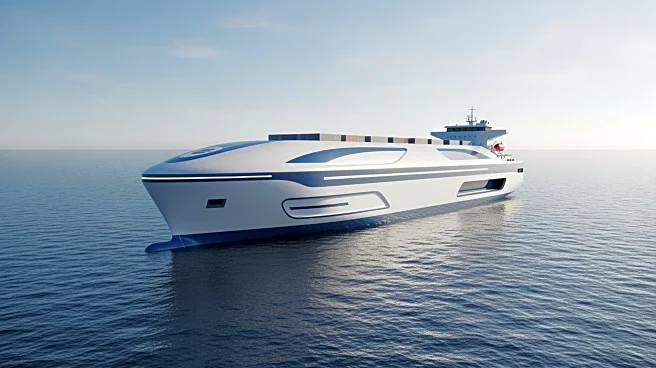What's Happening?
HD Korea Shipbuilding & Offshore Engineering (HD KSOE) has been granted Approval in Principle (AiP) by classification society DNV for its innovative 15,000 TEU container vessel design powered by Small Modular Reactor (SMR) technology. This design marks
a significant advancement in marine nuclear propulsion, featuring a supercritical CO2-based power generation system that enhances thermal efficiency and reduces equipment footprint compared to traditional steam systems. The vessel is designed to operate at 24 knots and includes a novel shielding and containment system to ensure reactor safety and vessel survivability in case of accidents. DNV's review confirms compliance with SOLAS Ch. VIII and the IMO Code of Safety for Nuclear Merchant Ships.
Why It's Important?
The approval of HD KSOE's nuclear-powered container ship design represents a pivotal step in the maritime industry's efforts to decarbonize shipping. By utilizing SMR technology, the design offers a cleaner alternative to conventional fossil fuels, potentially reducing greenhouse gas emissions significantly. This development could influence global shipping standards and encourage further investment in nuclear propulsion technologies. Stakeholders in the shipping industry, including shipbuilders and environmental groups, may see this as a promising solution to meet international emissions targets and enhance sustainability in maritime operations.
What's Next?
HD KSOE plans to continue collaborating with global partners to advance marine nuclear technologies. The successful implementation of this design could lead to further innovations in nuclear-powered vessels, potentially transforming the shipping industry. Regulatory bodies and environmental organizations will likely monitor the progress closely, assessing the safety and environmental impact of nuclear propulsion in commercial shipping. Future steps may include detailed design evaluations, prototype construction, and operational testing to ensure the technology's viability and safety.
Beyond the Headlines
The introduction of nuclear propulsion in commercial shipping raises ethical and legal considerations, particularly regarding nuclear safety and waste management. Long-term implications could include shifts in global shipping routes and infrastructure to accommodate nuclear-powered vessels. Additionally, this development may prompt discussions on international regulations governing nuclear technology in civilian applications, influencing policy decisions and public perception of nuclear energy.















